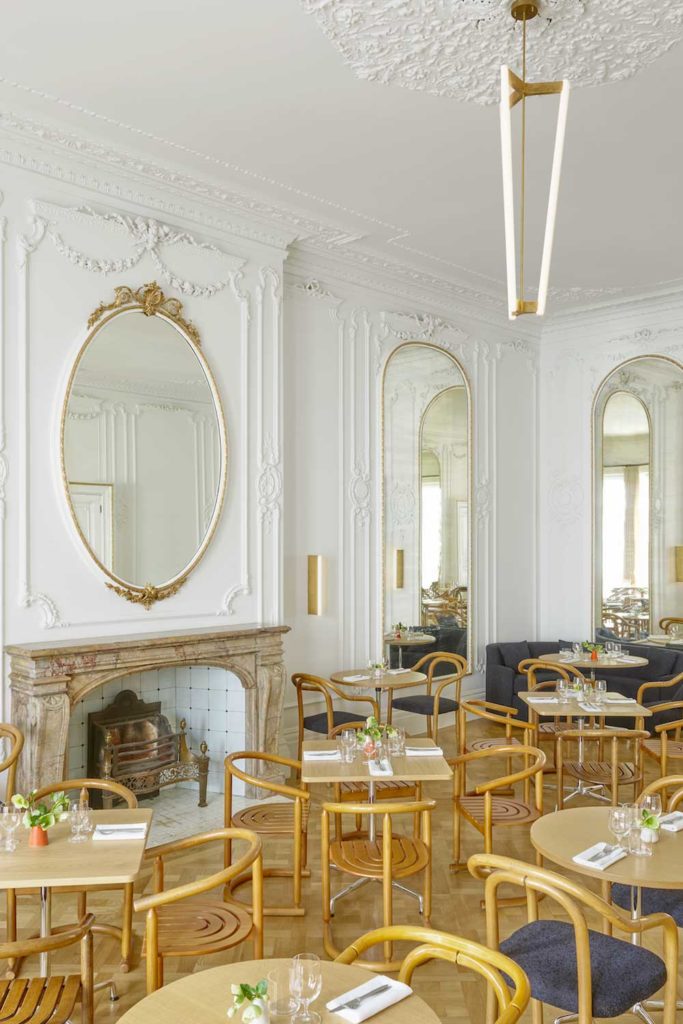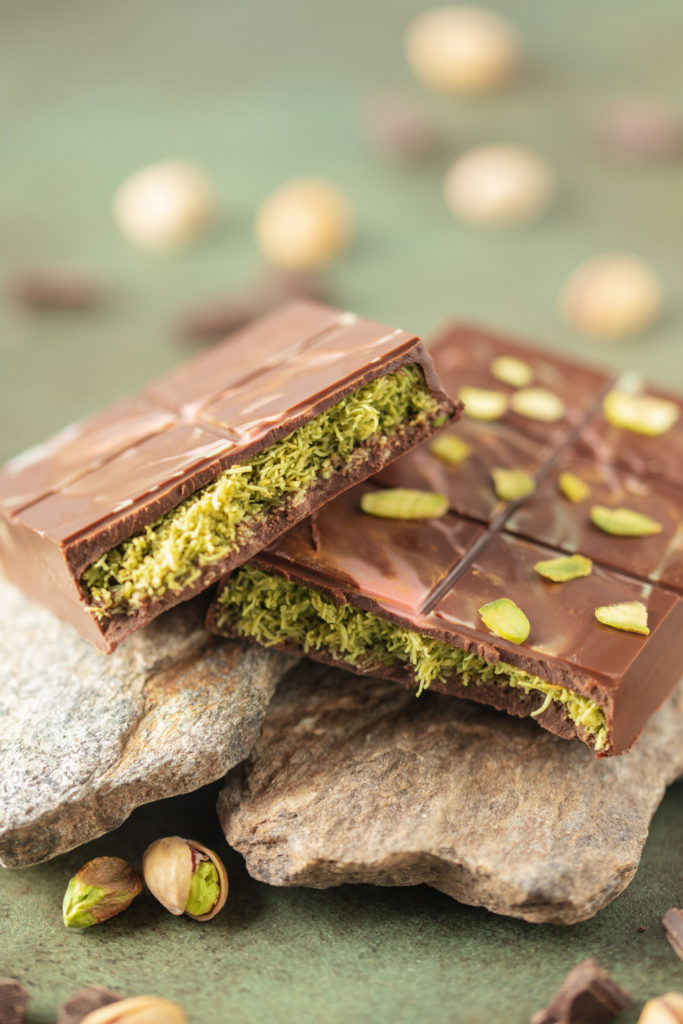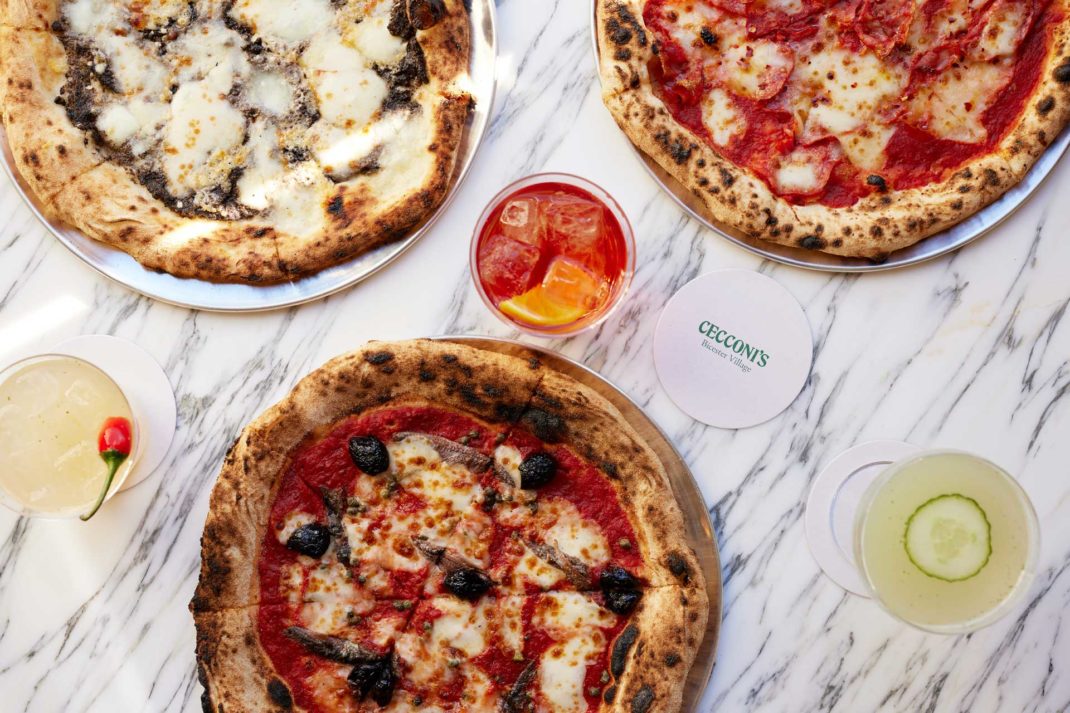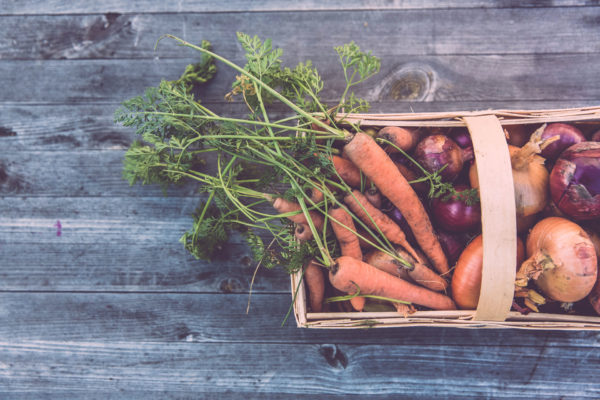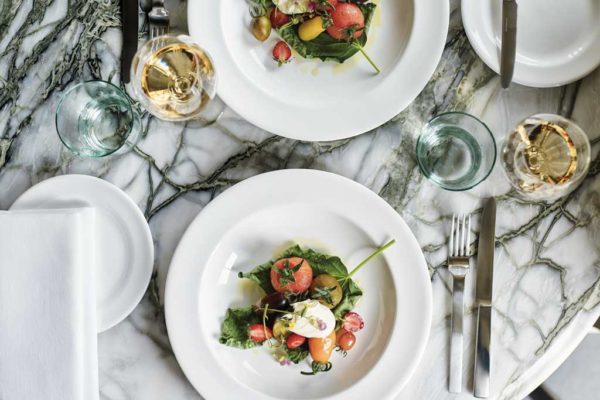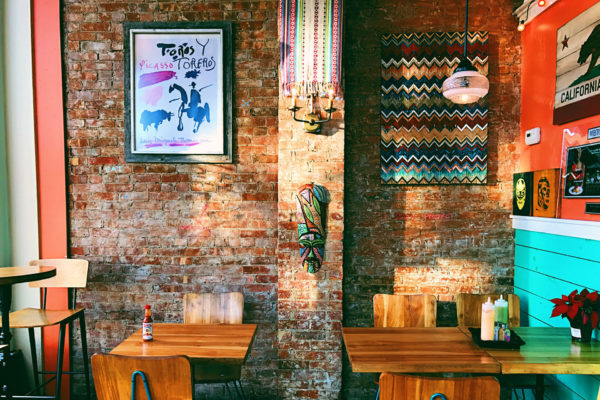Douglas McMaster’s Silo & 16 More Of London’s Best Eco-Friendly Restaurants
By Ellie Smith
1 year ago
Eco-minded eateries
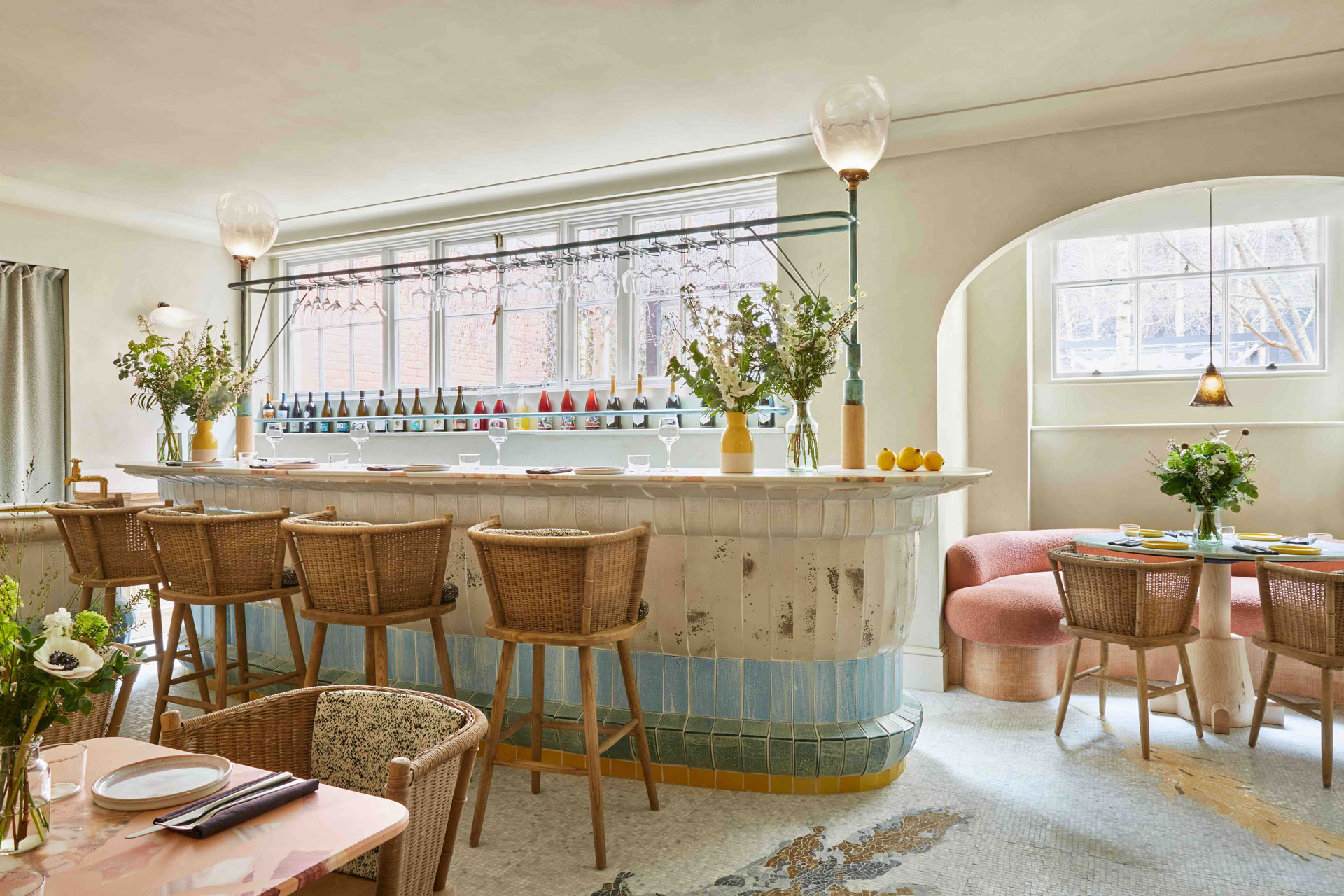
It’s funny to think there was a time when people would turn their nose up at low-waste, nose-to-tail cooking. Nowadays, diners are actively seeking out restaurants which demonstrate eco-friendly principles – and the places that aren’t are getting left behind. Most good eateries are trying to minimise their impact on the environment, but there are some standouts, which we’ve highlighted here. Our pick of London’s most sustainable restaurants features the names that put the planet front and centre. That means eco-friendly principles are seen throughout all parts of the business: from using seasonal, locally sourced ingredients to cutting carbon emissions in the kitchen and taking part in charitable fundraising initiatives. From organic pubs to farm-to-table dining rooms, these are the capital’s greenest culinary spots.
Best Sustainable Restaurants In London 2024
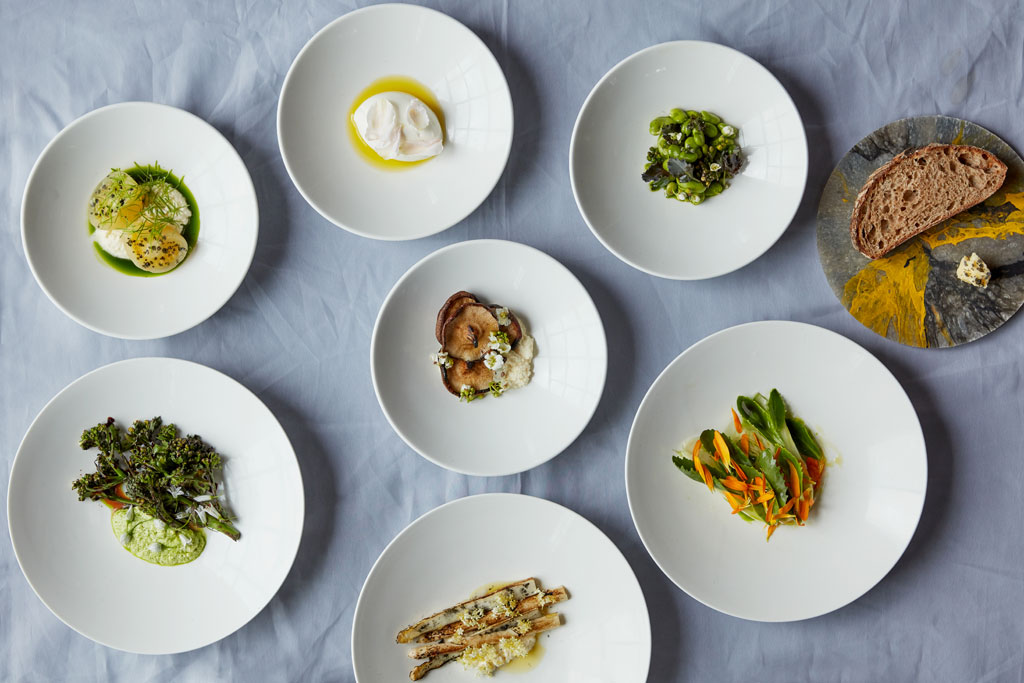
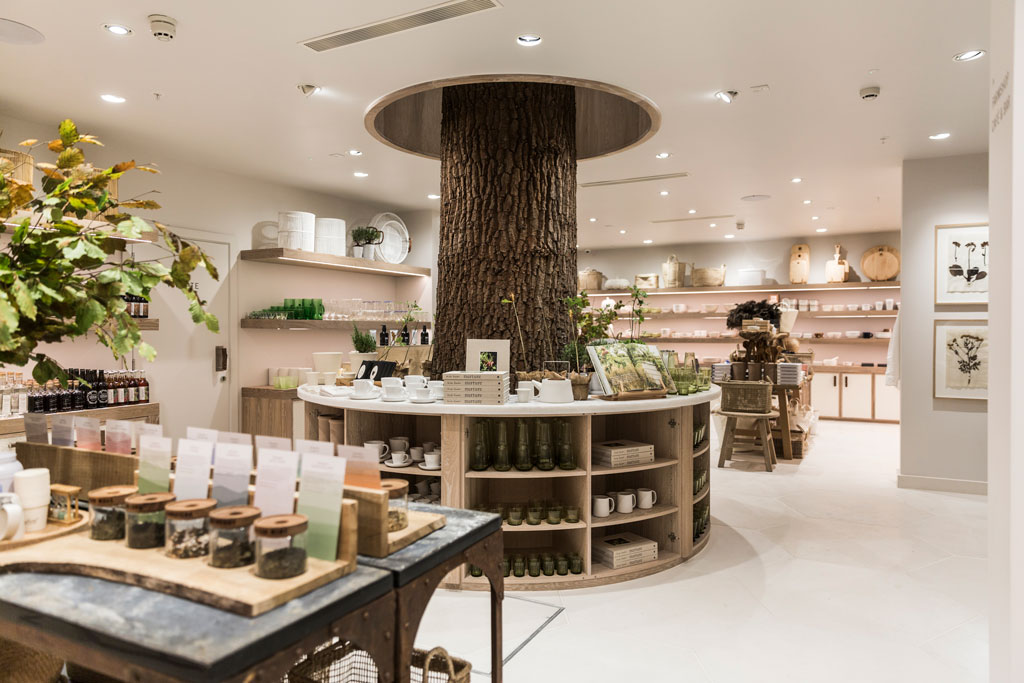
Daylesford Brompton Cross
Motivated by a desire to feed her children better, Lady Carole Bamford set out to turn her family’s farmland into a sustainable business. Little did she know, 40 years later Daylesford would stand as one of the most sustainable farms in the UK, supplying fresh, organic produce to restaurants across the country. The group’s most recent London venture, Brompton Cross, offers up a mixture of truly organic dishes using ingredients grown on the farm, from green pastured beef burgers to sourdough pizzas to brightly coloured salad bowls. To guarantee the freshest of food, produce is picked only when perfectly ripe, and taken straight to the chefs in the kitchen. A leader in the eco-friendly food movement, Daylesford Brompton Cross celebrates a zero waste policy, ensuring packaging is recyclable, reusable or compostable, and no food is thrown away. Any extra food is sent to The Felix Project, who go on to redistribute it to those in need around London, while straws are made from wheat stalks and customers are encouraged to bring their own reusable cups. Fitting, then, that the three-storey space is designed around a huge oak tree, which was saved by the Bamford family and transformed into a piece of natural art.
76-82 Sloane Ave, Brompton Rd, London SW3 3DZ, daylesford.com
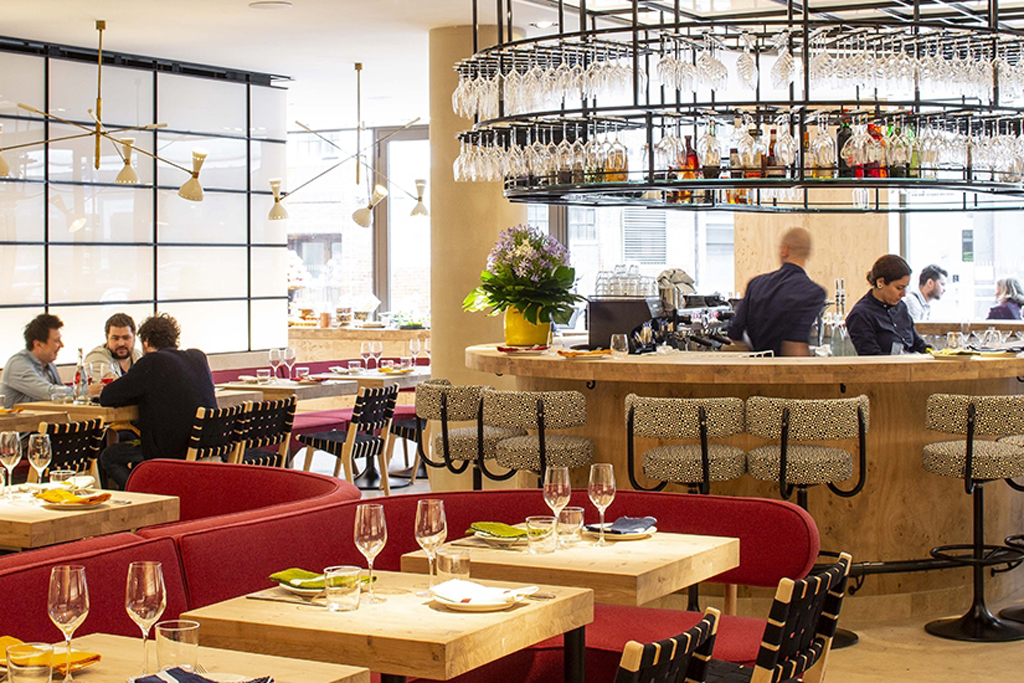
Rovi, Fitzrovia
Ottolenghi’s Rovi uses fermentation techniques to make vegetables more interesting, and recycles heat energy from the kitchen to heat the space. Fruit and vegetables are sourced sustainably from a biodynamic farm in Sussex, while all unused produce is reused in other forms, for instance unused wine goes towards making vinegar, and unsold coffee grounds helps cook hasselback lime beetroots. Check out the brand-new lunch menu, where you can enjoy two courses for £35pp or three for £39pp. Think sweet and sour leeks, Iranian butternut squash stew, and hake sarma with jewelled rice.
59 Wells St, London W1A 3AE, ottolenghi.co.uk
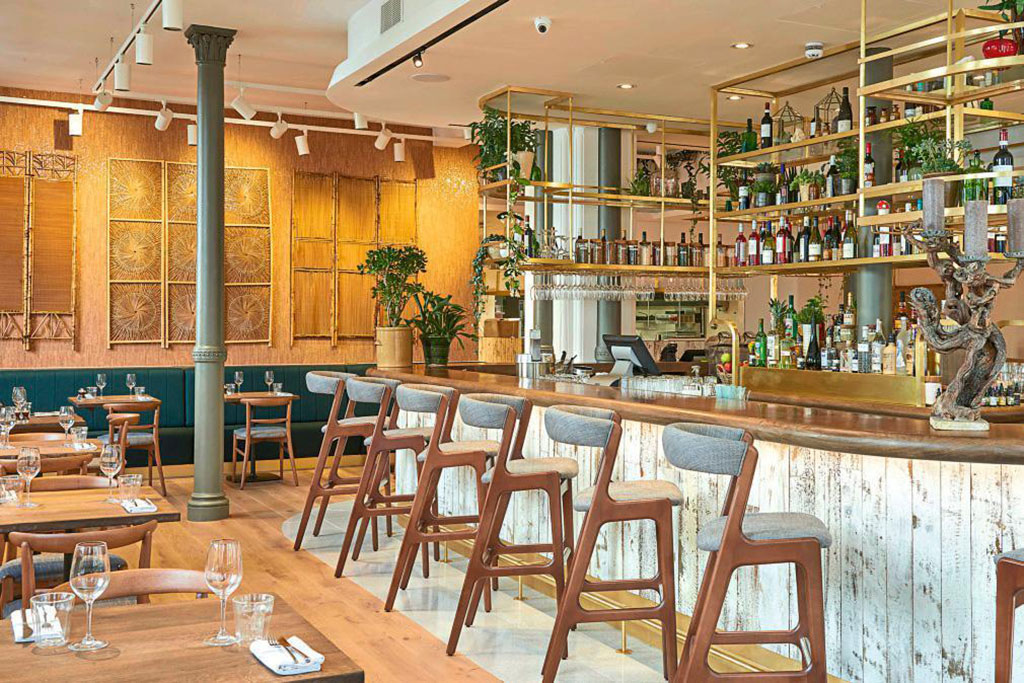
Farmacy, Notting Hill
Plant-based Notting Hill eatery Farmacy uses recyclable or compostable packaging, adopts a ‘root to fruit’ philosophy, and ensures food waste is kept to an absolute minimum. All ingredients used are either grown on the farm or sourced from local suppliers, and the restaurant champions biodynamic sustainability, with a fully organic and biodynamic wine offering. The menu reads like your nutritionist’s wish list: think kale caesar salad, pumpkin and turmeric curry and miso roasted aubergine, paired with superfood smoothies and seasonal cocktails.
74-76 Westbourne Grove, London W2 5SH, farmacylondon.com
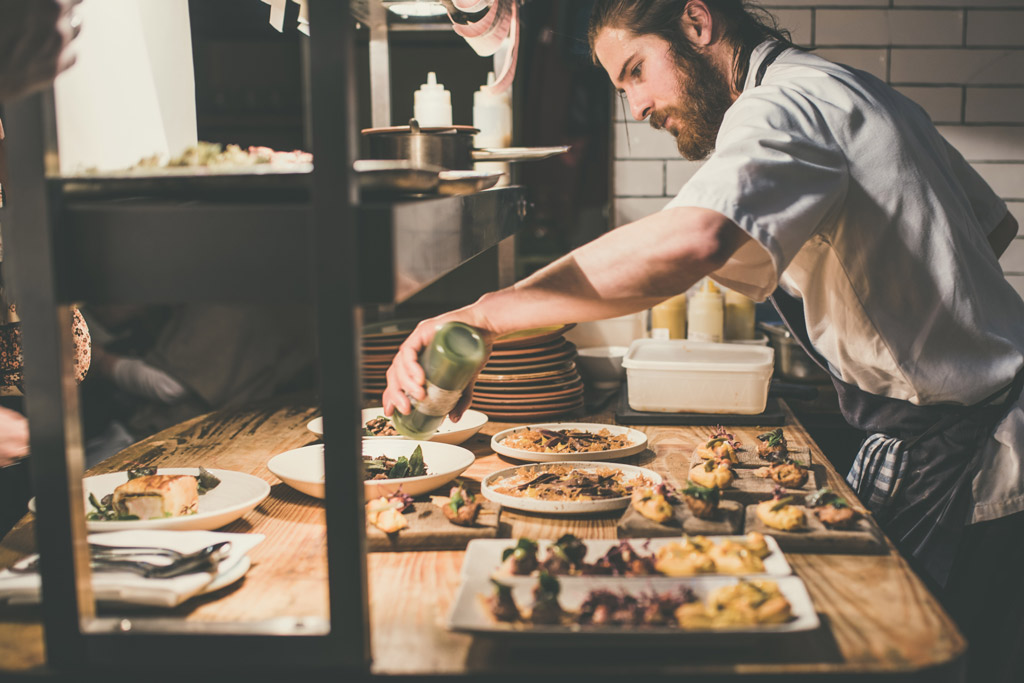 Rabbit, Chelsea
Rabbit, ChelseaRabbit, Chelsea
Born on a vineyard to two chefs, the Gladwin brothers were destined for the world of restaurants. Following a childhood of eating heartily and driving tractors on the family’s farm in Nutbourne, Sussex, the three boys went their separate ways – Richard became a restaurant manager and Oliver a chef, while the youngest, Gregory, remained true to his roots, working as a farmer. Turns out, the manager-chef-farmer trio lends itself pretty well to the farm to table culinary format. The brothers’ now have a collection of sustainable London restaurants under their belt, one being Rabbit: a cosy, rustic spot on the King’s Road. All food is based around their local and wild ethos, using sustainable livestock from the family’s Nutbourne farm, Ashurst Wood. The menu changes regularly, but dishes tend to come as small plates, perfect for a tapas-style sharing meal. You could be eating Sussex beef tartare with star anise pickled carrot, venison cigars with harissa and pickled mustard seeds or aged chorizo with labneh – whatever is on the cards for that day, you can guarantee it will be fresh, authentic and delicious. The Gladwins are industry leaders in the farm to table world – as Oliver tells us: ‘I can speak to a grower today and get the beetroots up to the restaurant tomorrow, they’ll be out of the ground in 20 minutes.’ Its other ventures include Nutbourne in Battersea, The Shed in Notting Hill and Sussex in Soho.
172 King’s Rd, London SW3 4UP, rabbit-restaurant.com
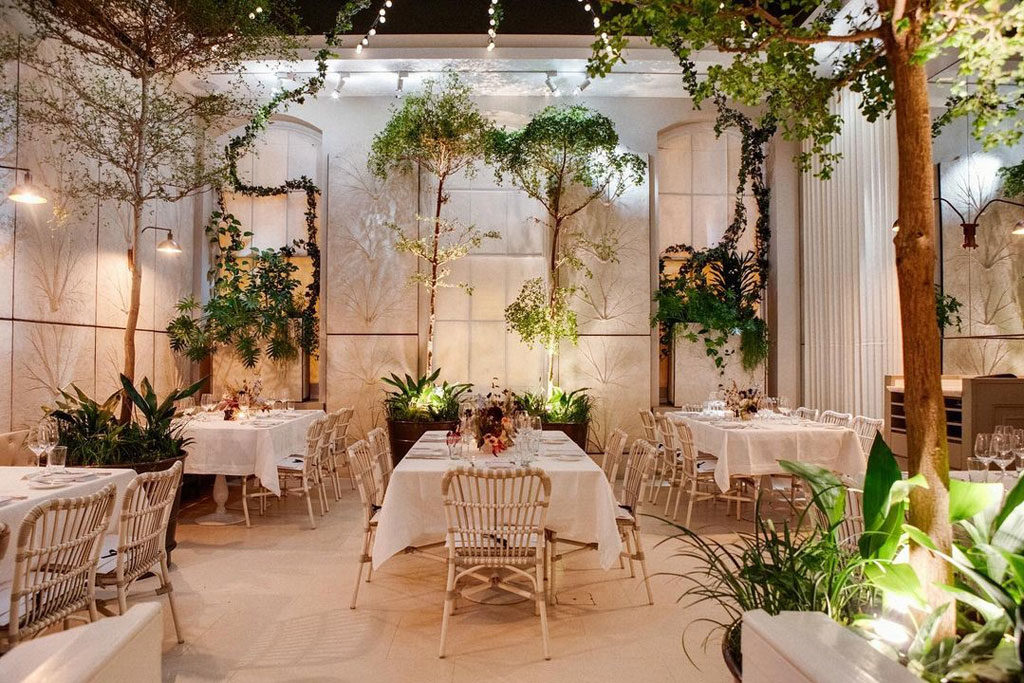
Spring, Somerset House
With its pastel hues, 19th-century pillars and leafy atrium, Spring at Somerset House is one of the prettiest restaurants in town – yet it’s certainly not style over substance. The sustainable restaurant is headed up by eco-chef Sky Gyngell, who launched a sustainable ‘Scratch Menu’ back in 2016 to raise awareness on food waste. Then, in 2019, Spring became the first single-use plastic-free restaurant in London. Naturally, the menu is produce-led and seasonal, with current offerings including grilled lamb with cavolo nero, wild halibut with Fern Verrow cauliflower, and Dorset crab with ‘nduja. The ‘Scratch’ menu, meanwhile, is created using waste produce, such as beetroot tops, potato skins and yesterday’s bread.
Lancaster Pl, London WC2R 1LA, springrestaurant.co.uk
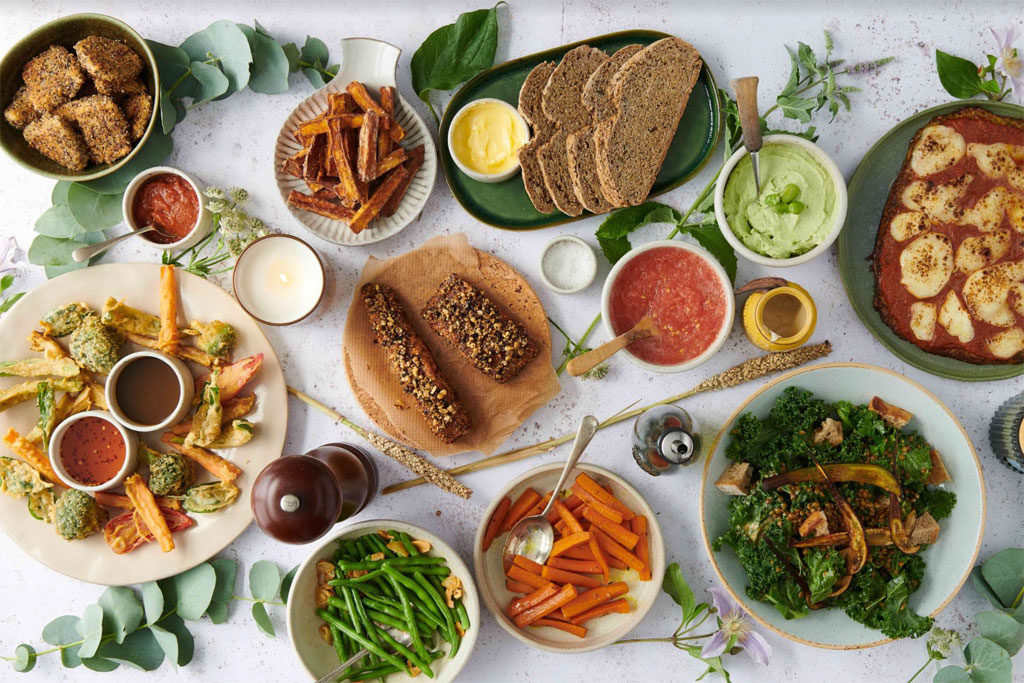
AT Feast, St. John’s Wood
Zero waste dining sits at the heart of AT Feast, an all-day dining brasserie and cookery school in St John’s Wood. The restaurant creates its menu using food that would normally be thrown away, using local suppliers that put the planet at the forefront of their business. Think feel-good, vibrant dishes: kale and ricotta fritters, meatless shepherd’s pie and zero waste burgers.
AT feast brasserie, 49-51 St John’s Wood High St, London NW8 7NJ, atfeast.com
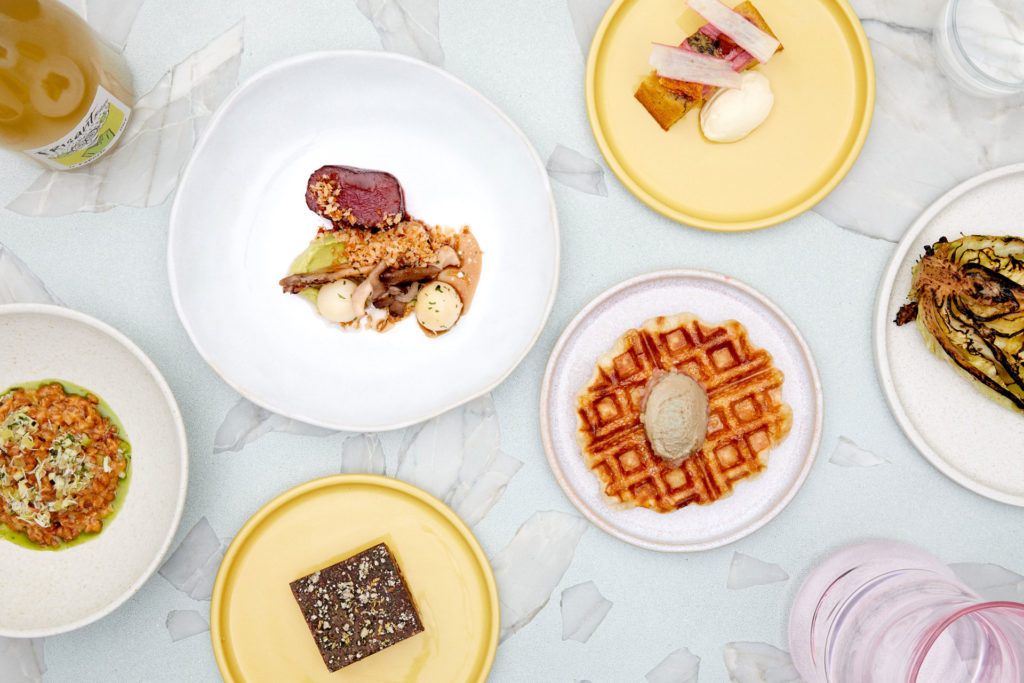
Native at Browns, Mayfair
Mayfair has upped its green credits with the arrival of an outpost of wild food restaurant Native. The pioneering eatery sits within the flagship boutique of British retailer Browns, offering a menu of seasonal produce-led dishes, natural wines and foraged cocktails. A typical meal could include Cacklebean duck egg and foraged sea herbs, followed by poached brill with Sutton Farm chard and ribeye, with a ‘Mermillionaire Shortbread’ to finish: a seaweed-infused take on the classic pudding.
Browns 39, Brook St, London W1K 4JE, nativerestaurant.co.uk
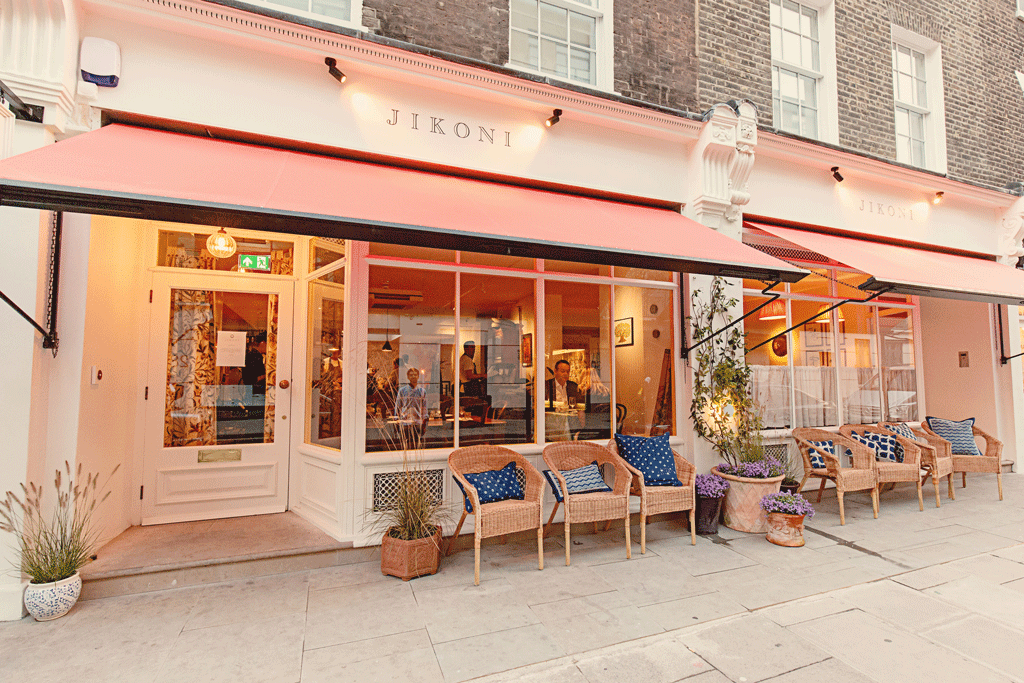
Jikoni, Marylebone
In June 2021, Nadeem Lalani Nanjuwany and Ravinder Bhogal’s Marylebone eatery Jikoni became the first carbon neutral independent restaurant in the UK. Sustainability has been on the founders’ minds since opening in 2016, and since 2019 the restaurant has been powered by solar power, wind power and carbon neutral ‘green gases’. But recently they took things to the next level by partnering with non-profit organisation Climate Neutral.
19-21 Blandford St, London W1U 3DJ, jikonilondon.com
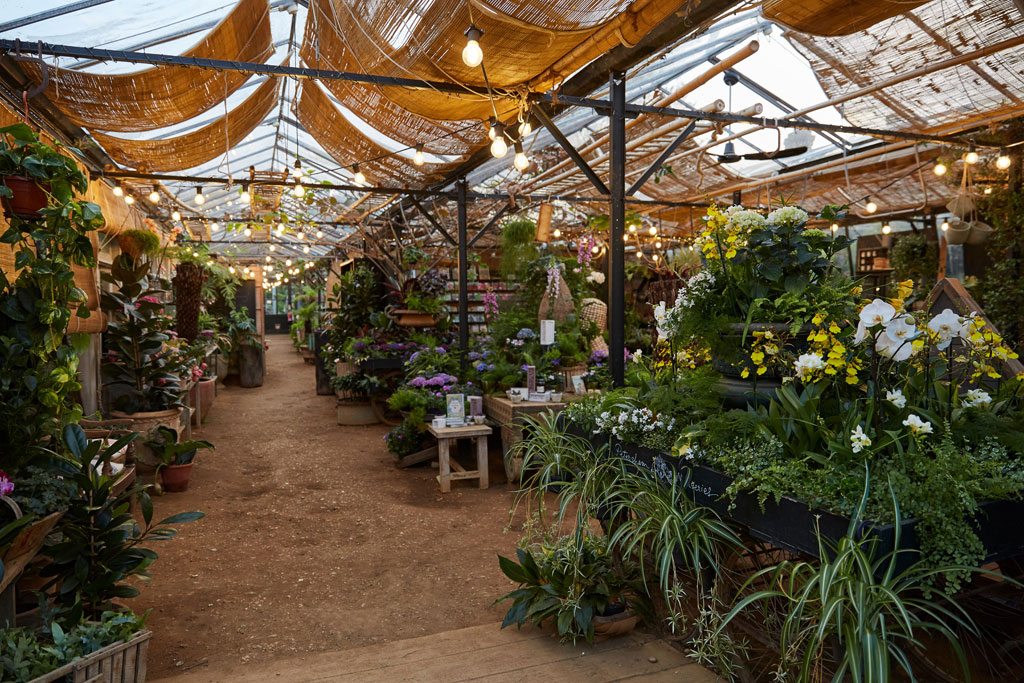
Petersham Nurseries, Richmond
Nature is intrinsic to Richmond’s Petersham Nurseries, a glasshouse restaurant brimming with flowers and greenery. Founded back in 2004 by Francesco and Gael Boglione around the slow food philosophy of ‘Good, Clean and Fair’, the eatery was something of a pioneer in sustainable dining. Nearly all waste from the restaurant is recycled, while an aerobic food digester turns food waste into water. Chefs’ jackets, meanwhile, are made from recycled bottles. Much of the produce for the restaurant comes from the family farm in Devon, where organic farming is practiced. All this has led to the restaurant being awarded with a Michelin Green Star, a new award introduced to celebrate the food spots leading the way in eco-friendly food.
Off Church Ln, Petersham Rd, Richmond TW10 7AB, petershamnurseries.com
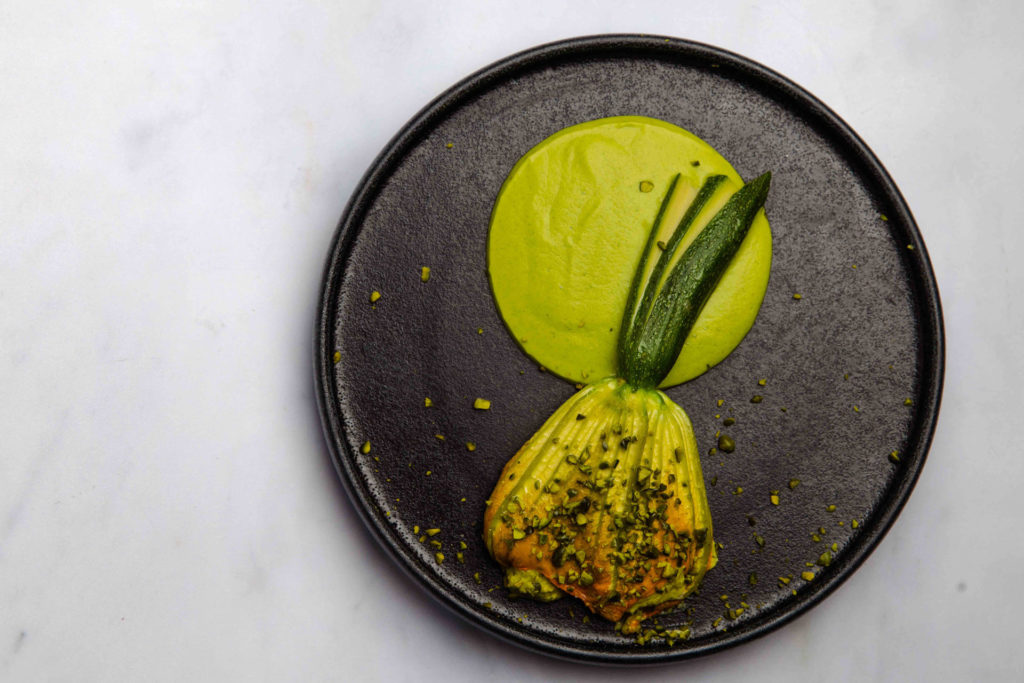 Photo by Edward Howell
Photo by Edward HowellWarehouse at The Conduit
The Conduit club is a hub for people who are passionate about driving positive social change. In November 2021 a public restaurant launched there: Warehouse, run by ex-Silo chef Brendan Eades. In line with The Conduit’s values, the eatery has a strong environmental focus, with carefully sourced ingredients – think day-boat fish suppliers, organic dairy farmers and ancient grain producers – alongside a seasonal cocktail menu courtesy of mixologist Walter Pintus. Décor is also eco-friendly, featuring hand-woven curtains and baskets, paved flooring and reclaimed furniture.
6 Langley St, London WC2H 9JA, theconduit.com
Photo by Edward Howell
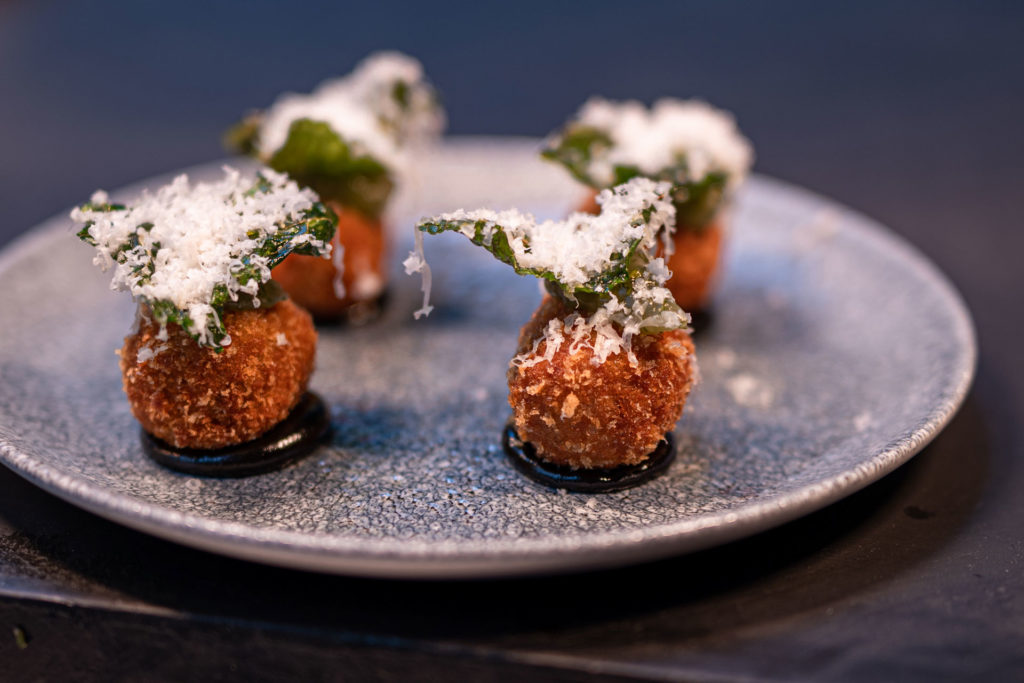
Fallow, St James’s
Following its 12-week pop-up in 2021, sustainable food concept Fallow launched a permanent site in St James’s Market. Founded by chefs Will Murray and Jack Croft, alongside chairman James Robson, the site revolves around sharing-style dishes, with a focus on whole animal butchery. That means dishes like smoked cod’s head with Sriracha sauce, octopus tikka masala, and Bathurst Estate venison with mushrooms. An eco-friendly approach is also be seen through the décor, which features terrazzo-style shellfish panelling on the walls, made using leftover oyster and mussel shells accrued from their Heddon Street residency.
52 Haymarket, St. James’s, London SW1Y 4RP, fallowrestaurant.com
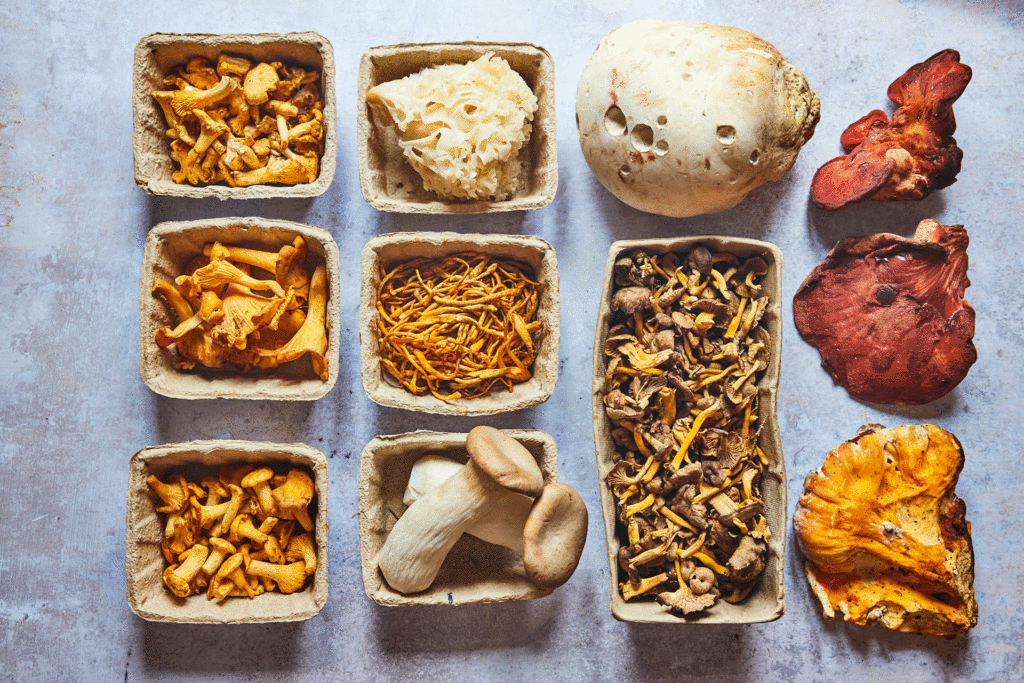
FIELD by Fortnum’s, Piccadilly
The newest restaurant at Fortnum & Mason’s Piccadilly home is FIELD, a sustainable restaurant based on the ground floor. It offers seasonal dishes featuring British grown ingredients, with meat, dairy and vegetables sourced from small-scale regenerative farms. Tuck into dishes like New Forest asparagus with heritage tomato, basil risotto, and Devon white chicken with Jerusalem artichoke puree and savoy cabbage.
Ground Floor, Mezzanine Fortnum & Mason, 181 Piccadilly, St. James’s, London W1A 1ER, fortnumandmason.com
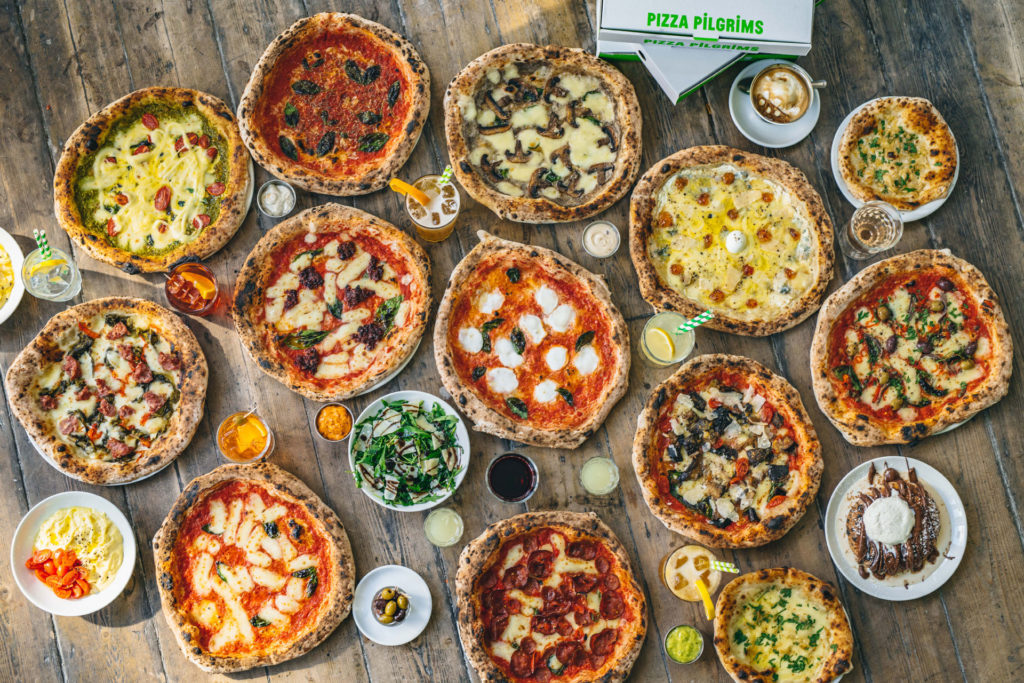
Pizza Pilgrims at Selfridges, Oxford Street
Pizza Pilgrims gets an eco-twist in its latest outpost, found on the the fourth floor of Selfridges. Enter through a three-metre hydroponic basil tunnel before tucking into an exclusive menu of pizzas made using regenerative dough alongside drinks from reusable kegs. The décor, too, is eco-friendly, with upholstery made from vegan Pinatex – a leather alternative made from pineapples – and tabletops crafted from reclaimed plastic waste. Menu highlights include a wild mushroom, truffled ricotta and burrata pizza, a stuffed burrata side dish and a strawberry pistachio sundae.
4th floor, 400 Oxford St, London W1A 1AB, pizzapilgrims.co.uk
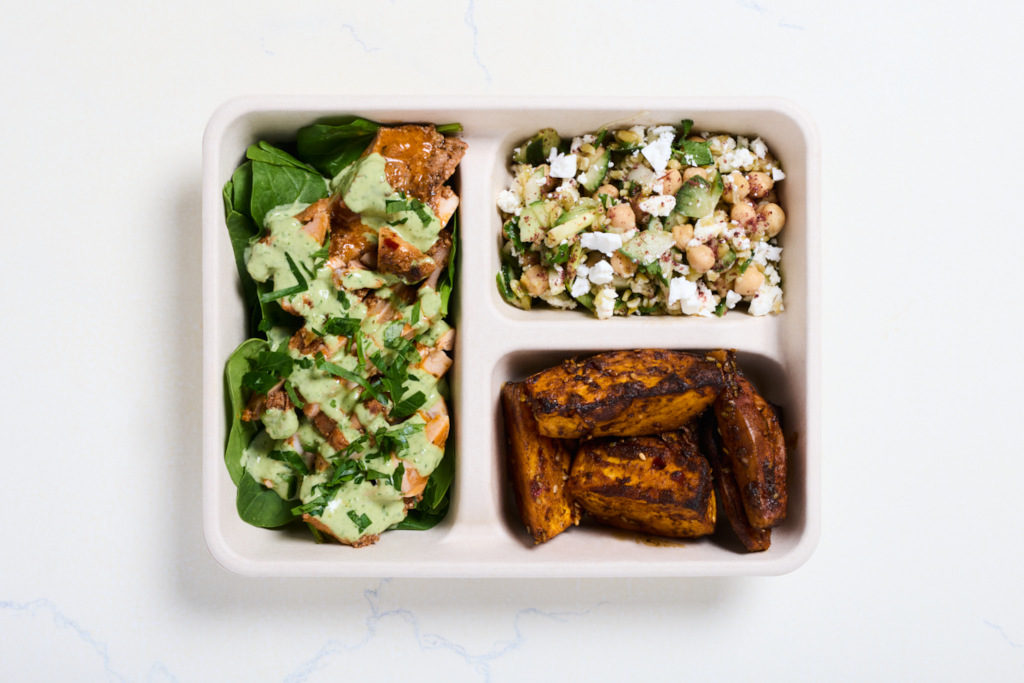
Farmer-J, Various Locations
Farmer-J, the new hit lunch spot, has recently blown up on TikTok. It offers a seasonal and healthy lunch menu inspired by Middle Eastern flavours, and with ingredients sourced straight from the farm. With an eco-friendly ethos and tasty dishes like harissa chicken, seasonal mac ‘n’ cheese, and kale and miso slaw, it makes the ideal spot to grab lunch from when you’re in the office. Impressive credentials include the fact that 90 percent of its packaging is biodegradable (the aim is to make this 100 percent by 2024) and all meat and fish is responsibly sourced. The company also regularly teams up with charities like Choose Love and Action Against Hunger.
Multiple locations, farmerj.com
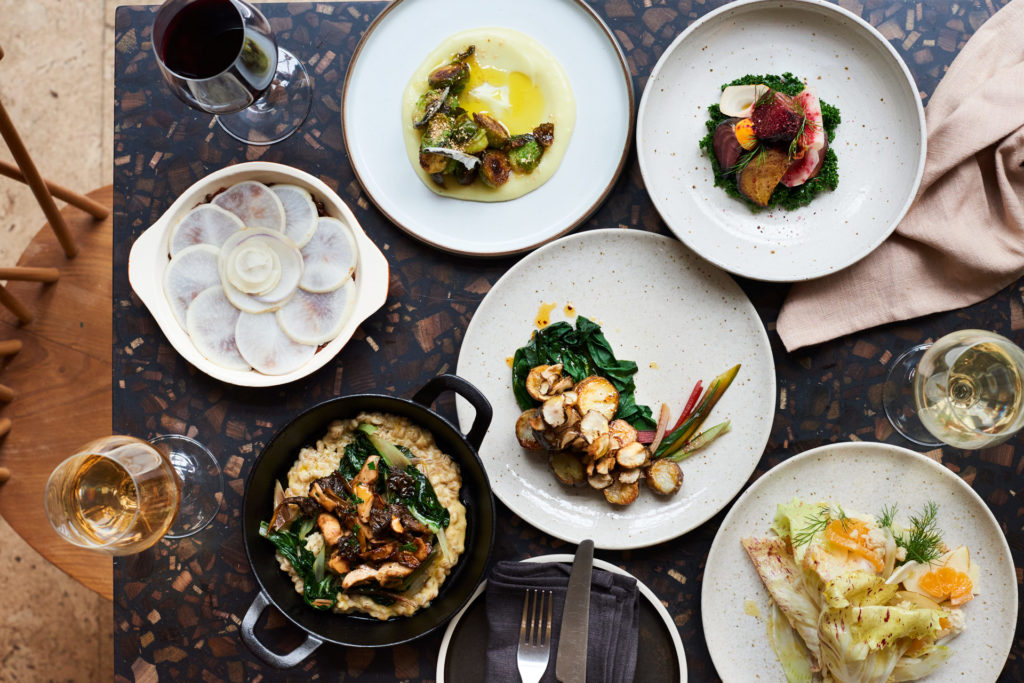
Edit, Hackney
Edit is a hyper-seasonal restaurant in Hackney spearheaded by architect-turned-restauranteur Elly Ward. The menu is built around zero-waste, ‘root to fruit’ principles, with ingredients sourced from local small-scale farms, foragers and independent producers. A regularly changing menu is devised in accordance with availability – so this season, diners can expect dishes like celeriac scallops, oyster mushrooms with barley miso glaze, and pickled pear with chocolate ganache. Choose between five and seven-course tasting menus, or opt for the Seasonal Edit, where you can enjoy three courses for £30.
217 Mare St, London E8 3QE, edit.london
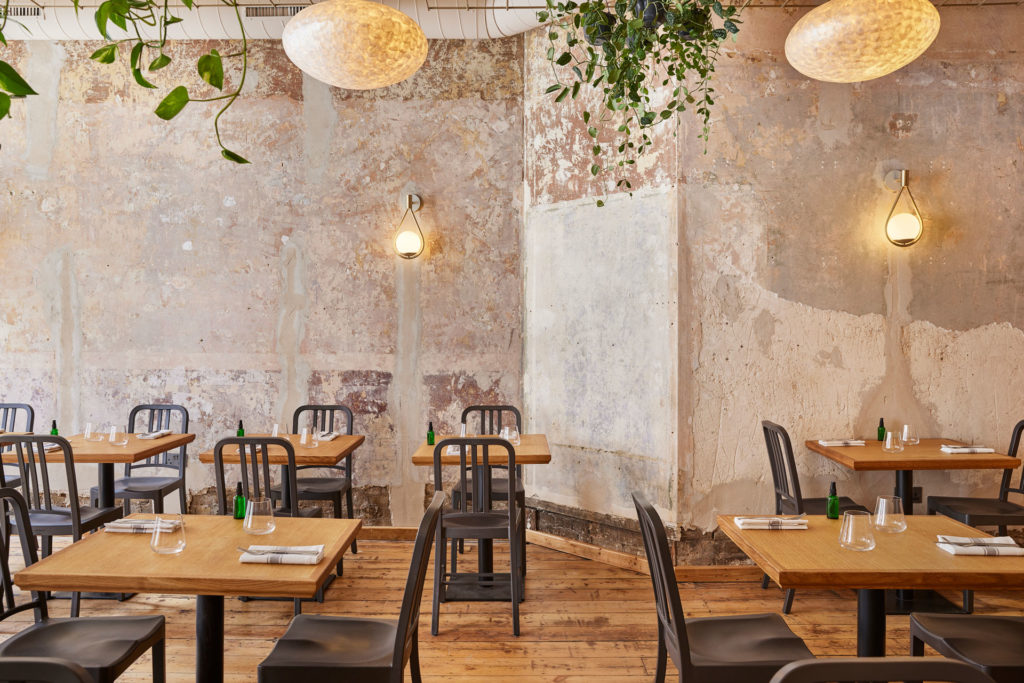
Apricity, Mayfair
Chantelle Nicholson’s Apricity is one of the coolest – and most eco-friendly – restaurants of the moment. Located in Mayfair, it focuses on hyper-seasonal produce from small-scale farmers, plus locally foraged ingredients, to make an array of beautifully curated plates. Regenerative principles are applied through all aspects of the business, with a focus on retaining staff as well as instilling low-waste principles in the kitchen. The current menu featuring dishes like Cheswell Grange ox tongue with Namayasai farm daikon; Allwood Farm aubergine with herbed gnocchi and chimichurri; and butter-poached pollock with orzo – alongside five or seven-course tasting menus. The wine list, meanwhile, focuses on growers who prioritise soil regeneration and biodiversity. All this led the restaurant to be awarded with a Green Michelin Star.
68 Duke St, London W1K 6JU, apricityrestaurant.com

Silo, Hackney
Douglas McMaster‘s Silo is one of the most famous sustainable restaurants around. From trading directly with farmers to composting leftover scraps in the kitchen’s own compost machine, Silo’s continuing aim is to ‘close the loop’ in the food production process. Arguably one of the most sustainable restaurants in London, the eatery serves up a daily dinner menu of 10-15 dishes, such as smoked violet carrots with egg yolks; and Jerusalem artichokes cooked on fire with stilton sauce and pickles. On weekends it’s open for brunch too, serving everything from porridge to kimchi to on-site brewed kombucha. Housed on the upper floor of The White Building, the quirky space features interiors designed by Nina Woodcraft – known for her commitment to sustainable design – alongside material conservationist Seetal Solanki.
Unit 7, The white building, 1st Floor,c/o CRATE Bar, Unit 7 Queen’s Yard, London E9 5EN, silolondon.com

